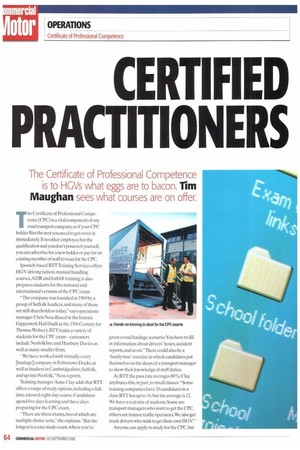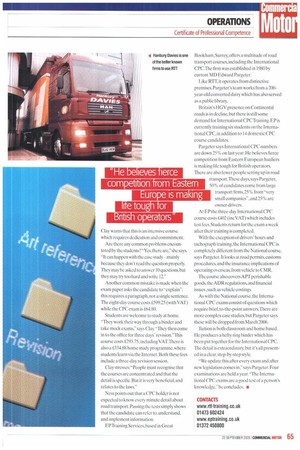CERTIFIED PRACTITIONERS
Page 72

Page 73

If you've noticed an error in this article please click here to report it so we can fix it.
The Certificate of Professional Competence is to HGVs what eggs are to bacon. Tim
Maughan sees what courses are on offer.
The Certificate of Professional Competence (CPC) is a vital component of any road transport company, so if your CPC holder flies the nest you need to get cover in immediately. If no other employee has the qualification and you don't possess it yourself you can advertise for a new holder or pay for an existing member of staff to train for the CPC.
Ipswich-based RTTTraining Services offers HGV driving tuition,manual handling courses,ADR and forklift training; it also prepares students for the national and international versions of the CPC exam.
"The company was founded in 1969 by a group of Suffolk hauliers, and many of them are still shareholders today," says operations manager Chris Ness. Based in the historic Gippeswyk Hall (built in the 15th Century for Thomas Wolsey), MT trains a variety of students for the CPC exam —customers include Norfolkline and Hanbury Davies as well as many smaller firms.
"We have worked with virtually every [haulage] company in Felixstowe Docks, as well as hauliers in Cambridgeshire. Suffolk, and up into Norfolk," Ness reports.
Training manager Anne Clay adds that RU offers a range of study options, including a fulltime, tutored eight-day course. Candidates spend five days learning and three days preparing for the CPC exam.
"There are three exams, two of which are multiple choice tests," she explains."But the longest is a case study exam, where you're given a road haulage scenario. You have to fill in information about drivers' hours, accident reports, and so on,"There could also be a 'family tree' exercise in which candidates put themselves in the shoes of a transport manager to show their knowledge of staff duties.
At RTlf the pass rate averages 80%; Clay attributes this, in part, to small classes: "Some training companies have 20 candidates in a class. KIT has up to 16, but the average is 12. We have a real mix of students. Some are transport managers who want to get the CPC, others are trainee traffic operators.We also get truck drivers who wish to get their own HGV."
Anyone can apply to study for the CPC, but Clay warns that this is an intensive course which requires dedication and commitment.
Are there any common problems encountered by the students?"Ycs, there are," she says. "It can happen vvith the case study — mainly because they don't read the question properly. They may be asked to answer 10 questions, but they may try too hard and write 12."
Another common mistake is made when the exam paper asks the candidate to "explain": this requires a paragraph, not a single sentence. The eight-day course costs £599.25 (with VAT) while the CPC exam is £64.80.
Students are welcome to study at home. "They work their way through a binder and take mock exams," says Clay. "They then come in to the office for three days' revision."This course costs t293.75, including VAT.There is also a £334.88 home study programme, where students learn via the Internet. Both these fees include a three-day revision session.
Clay stresses:" People must recognise that the courses are concentrated and that the detail is specific. But it is very beneficial, and relates to the laws."
Ness points out that a CPC holder is not expected to know every minute detail about road transport. Passing the tests simply shows that the candidate can refer to, understand, and implement information.
EPTraining Services, based in Great Bookham, Surrey, offers a multitude of road transport courses, including the International CPC. The firm was established in 1980 by current MT) Edward Pargeter.
Like RTT, it operates from distinctive premises. Pargeter's team works from a 200year-old converted dairy which has also served as a public library.
Britain's HGV presence on Continental roads is in decline, but there is still some demand for International CPC Training. EP is currently training six students on the International CPC, in addition to 14 domestic CPC course candidates.
Pargeter says International CPC numbers are down 25% on last year. He believes fierce competition from Eastern European hauliers is making life tough for British operators. There are also fewer people setting up in road transport.These days, says Pargeter, 50% of candidates come from large transport firms, 25% from "very small companies", and 25% are owner-drivers.
At EP the three-day International CPC course costs £402 (inc VAT) which includes test fees. Students return for the exam a week after their training is completed.
With the exception of drivers' hours and tachograph training, the International CPC is completely different from the National course, says Pargcter. It looks at road permits, customs procedures, and the insurance implications of operating overseas, from vehicle to CMR.
The course also covers APT perishable goods. the ADR regulations, and financial issues ,such as vehicle costing& As with the National course, the International CPC exams consist of questions which require brief, to-the-point answers.There are more complex case studies, but Pargeter says these will be dropped from March 2006.
Tuition is both classroom and home based. He produces a hefty ring binder which has been put together for the International CPC. The detail is extraordinary, but it's all presented in a clear, step-by-step style.
"We update this after every exam and after new legislation comes in," says Pargeter. Four examinations are held a year. "The International CPC exams are a good test of a person's knowledge," he concludes. •










































































































































































































